Volunteer
Let’s Learn About: Refugees
We are reflecting this month on Independence Day and the freedom that has attracted people to the United States. At World Relief Memphis, we often reflect on America as a country of immigrants and displaced persons. Throughout the generations, people have immigrated to the U.S. and established new lives. That continues today!
Refugees are just one of these immigrant groups.
The amount of competing information around immigration can be overwhelming. But World Relief has been welcoming refugees and other immigrants in partnership with churches and compassionate individuals like you since the 1970s, and for over 10 years here in Memphis!
World Relief Memphis specifically assists those who are seeking safety through various pathways established by the United States Government. In this five-part series, with help from our Initial Welcoming Services and Newcomer Outreach Service teams, we will be sharing the various different legal pathways to the U.S., how those pathways began, how we come alongside new arrivals, and how you can join us in welcome.
History
Refugees are one of the primary groups of people World Relief serves worldwide. To understand who they are and our role in the refugee resettlement process, lets take a look at World Relief’s history alongside legislation in the United States.
1940’s
1944 – The War Relief Commission of the National Association of Evangelicals (NAE) is founded in NYC for churches to address urgent humanitarian needs in war-torn Europe.
1948 – U.S. Congress enacts the “Displaced Persons Act of 1948” following the admission of more than 250,000 displaced Europeans from World War II (State Dept.).
1950’s
1950 – The War Relief Commission changes its name to World Relief Commission of the NAE
1950 – The United Nations establishes the High Commissioner for Refugees (UNHCR), also known as the UN Refugee Agency to “act as guardian of the 1951 Convention Relating to the Status of Refugees, which defines the legal protections for refugees” (USCIS).
1951 – The International Organization for Migration (IOM) was created. Originally called, “Intergovernmental Committee for European Migration,” as they were birthed from the migration crisis following WWII, IOM serves refugees in a similar capacity to the UNHCR (IOM).
1970’s
1972 – World Relief cares for 100,000 war-displaced people in Vietnam through it’s network of missionaries and church partners
1975 – World Relief provides food and medical care in Cambodia for refugees fleeing the Khmer Rouge genocide.
1979 – World Relief launches its refugee resettlement ministry through a network of church partners, helping Vietnamese boat people adjust to life in America. World Relief is the only evangelical agency authorized by the US State Department to resettle refugees.
1980’s
1980 – Congress passes the Refugee Act – “standardized federally-supported resettlement services for all refugees admitted to the United States” (State Dept.). The Act included the definition of refugee and gave instruction for “regular and emergency admission of refugees of all nationalities” (USCIS). It “provided the legal basis for the establishment of The Office of Refugee Resettlement at the Department of Health and Human Services.” This Act is establishes the annual Presidential Determination, setting the annual number of refugee admissions.
2000’s
2005 – The U.S. Citizenship and Immigration Services (USCIS) is created as a part of the Department of Homeland Security and “oversees refugee and asylum affairs” (USCIS). Their officers are “specifically-trained refugee officers who travel around the world to interview refugee applicants seeking resettlement in the United States.”
2012 – World Relief opens offices in Memphis to work with area churches and community partners to create a community of love and welcome for refugees.
*Want a more in-depth history of World Relief, immigration laws, and the resettlement process? Take our free workshop course here
The U.S. Refugee Resettlement Process
With that history, consider resettlement from the milestone of receiving official refugee status to arrival in the U.S.
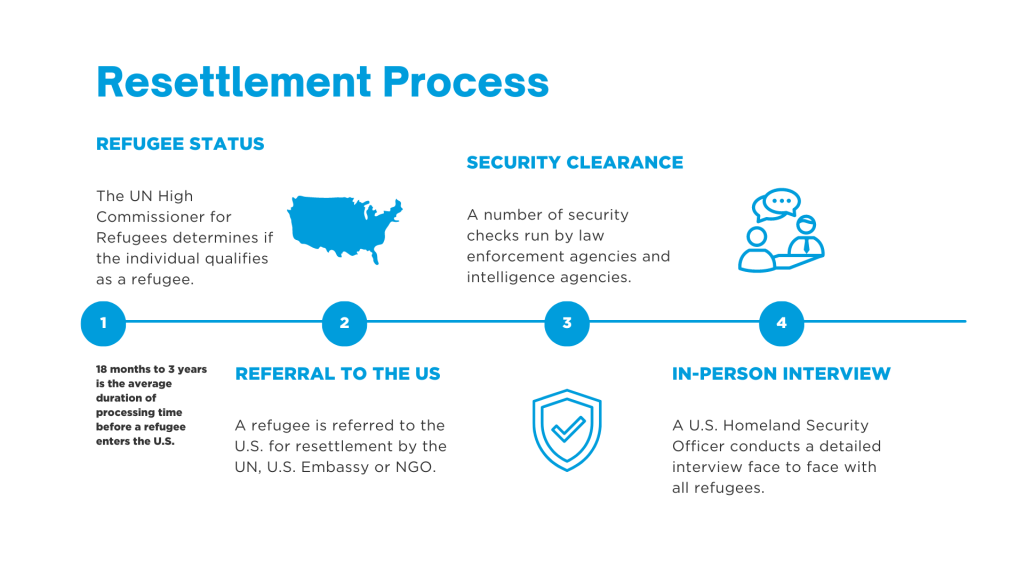
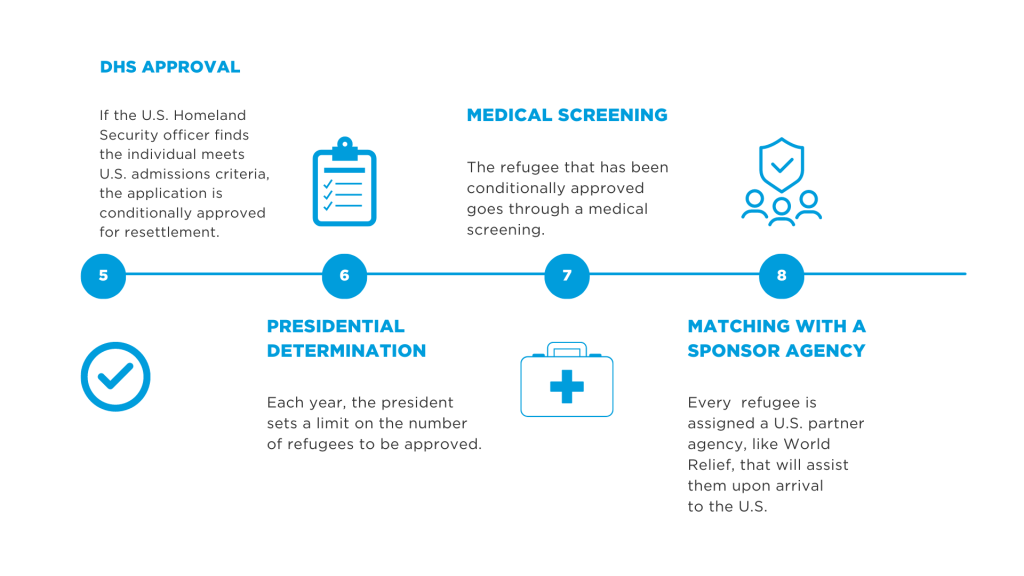
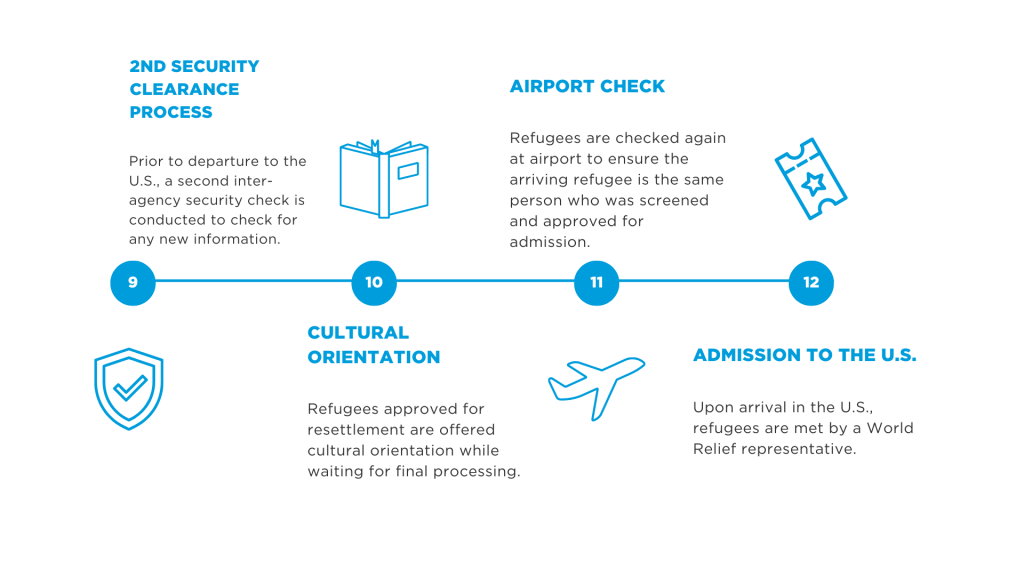
What We Do
Once a refugee is approved by the State Department, they are matched with a resettlement agency. World Relief Memphis is notified of a pending case through our Home Office and accepts the case.
In the days or weeks between this notification and the refugee’s arrival, our Initial Welcoming Services (IWS) team gets to work. A caseworker is assigned and is given access to the case specifics, including a general background of who is coming and if they have specific needs to be considered.
Simultaneously, our Church and Community Engagement staff is recruiting a volunteer Good Neighbor Team of 8-10 individuals to match with the new arrivals.
The caseworker then collaborates with our housing manager to find an apartment or rental house and with the volunteers, sets up the space with required necessities, sourced from donations or by purchasing through a portion of the incoming case’s Refugee Cash Assistance.
Arrival day is exciting! The Good Neighbor Team and IWS staff gather at the airport to provide a warm welcome and to celebrate this milestone. But over the next three months, there are many integration steps that individual or family must overcome. Our caseworkers aid their program participants in registering for their Refugee Cash Assistance, Social Security Card, Medicare, SNAP, and other elible government assistance programs. These programs are key for helping refugees in becoming self-sufficient.
Other vital steps in these first 90 days are the cultural orientation to the U.S., budget meetings reviewing travel debt, the currency system, and how to pay rent/ bills. The volunteer Good Neighbor Team is reinforcing these same principles as they go grocery shopping with a family, support budget planning, or help them practice talking with their landlord.
Once the initial 90 day period nears an end, clients may be matched with other volunteers and enrolled in eligible programs for extended case management:
- Economic Empowerment: aids in job readiness, application process, and placement.
- Holistic Support Services: aids clients in health and wellness goals, especially clients with additional vulnerabilities
- Refugee and Immigrant Youth Services: provides school enrollment services, group mentoring, and one-on-one mentoring where refugee and immigrant youth learn how to set and meet goals in their personal, school, and post-school life.
- The Connect Language Center: English as a Second Language (ESL) program open to program participants and the general public. Here students are enrolled in ESL classes of varying levels depending on starting knowledge.
How You can Help
The resettlement process is not a simple one, and it certainly doesn’t end at arrival. While we might be tempted to look away, the love of Christ compels us to turn toward the need — to consistently and lovingly step toward those who are hurting. If you’re like us, you’re asking yourself: How can I make a difference and create lasting change when the problems in the world are so big?
The good news is none of us has to take this journey alone. World Relief Memphis has been present and working in this city for the past 10 years and is equipped with 80 years of connections and expertise through the World Relief’s global network. We have been partnering with you, the local church and community to make Memphis a more welcoming community.
Here are 4 ways you can be a part of lasting change:
- Learn: There is always something to learn in the refugee resettlement world as we just displayed. World Relief Memphis has a Workshop with courses to learn more about cross-culture friendships with our newest neighbors, reflections on biblical thoughts about immigration, and more!
- Advocate: The immigration system is broken and you have a voice to change it for the better! Check out our Advocate page to see how you can share your voice on issues like passing the Afghan Adjustment Act, creating a just path to citizenship for Dreamers and other long-term immigrants, protections for Ukrainians, Asylum seekers, and more.
- Volunteer: Want to walk alongside individuals and families here in Memphis? Check out our volunteer page to see what opportunity is right for you. You can do everything from apartment set ups, driving clients to ESL classes, mentoring refugee and immigrant youth, to bring in a Good Neighbor Team where you get to welcome and walk alongside a refugee family for the first 6 months of their time in the U.S.
- Give: When you give to World Relief Memphis, whether it be once or monthly, monetarily or gift in kind, you are making a big difference in the lives refugees and other immigrants in vulnerable situations.
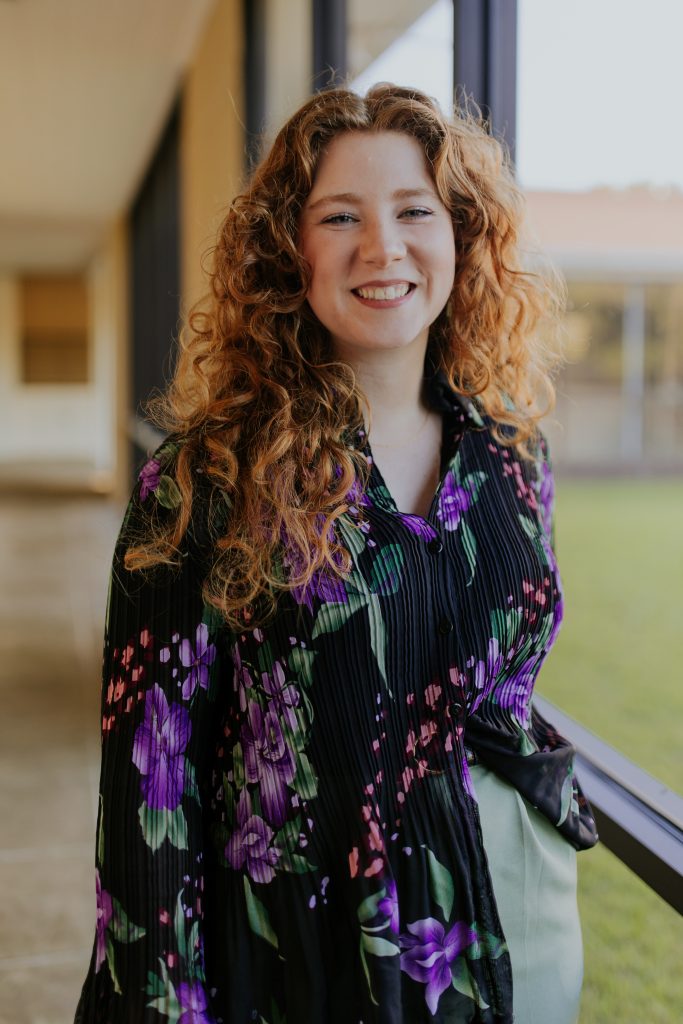
Writer: Kara Spencer
Communication Coordinator at World Relief Memphis, graduate of Harding University, & Memphis native.
If you would like to learn more about World Relief Memphis in the coming months, follow us on social media and sign up for our newsletter to stay up to date on events and volunteer opportunities.
If you are searching for an opportunity to begin making a bigger impact, join our new monthly giving program, The Path, for exclusive updates, virtual events, prayer chains, and stories of hope from the women, men, and children whose lives you change.
A Welcoming Community: Tara’s Volunteer Story
At World Relief we believe in the power of welcoming communities. Read how Tara participates in a welcoming community.
When the Taliban took over Kabul Tara saw many news reports about Afghans fleeing the country. The stories of families needing new homes inspired her to want to make a difference in her own community and an opportunity to serve with World Relief came across her path through her church, Christ the Rock. Tara signed up through her church to lead a Good Neighbor Team. A Good Neighbor Team is a small group of volunteers who welcome, walk alongside, and offer long-term reciprocal friendships with a newly arrived refugee family for six months.
However, Tara’s team had to wait a year before they could be matched with a refugee family. Although the wait was long, Tara says that it was worth the wait to be matched with the family they now partner with. The volunteer team used that time they waited to prepare for their experience as volunteers by watching videos about serving in ways that are empowering and discussing those ideas together as a team.
Building Friendships
Tara’s team was officially matched with their partner family, Joseph and Beatrice* and their children, in the beginning of this year. Joseph and Beatrice’s family is Congolese. Some of the things that the Good Neighbor Team has supported the family in has been transportation to medical appointments, answering questions about life in the U.S., and support through friendship. Tara shared that she was surprised how easily their team has been able to connect with Joseph’s family. Several members of the family speak English well and so the language barrier is less significant than Tara had expected.
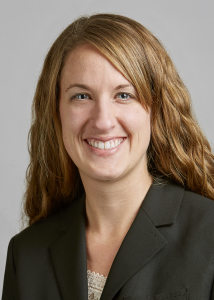
Congolese Hospitality
After volunteering for several months Tara is grateful that she decided to volunteer. She is grateful for her family’s opportunity to learn and grow in their friendship with Joseph and Beatrice. Tara’s family loves to visit Joseph and Beatrice’s family and enjoy time together in their home. Hospitality is very important in Congolese culture and Tara’s family feels honored to receive that hospitality. One of the things Tara is learning is to be more flexible. She says she’s learning that, “it’s about the moment and not the to-do list.”
Embracing Differences
One of the cultural differences that Tara has noticed is differences in how she prays and worships. Although both families share the Christian faith they express their faith very differently. The day after Joseph and Beatrice arrived in the Fox Valley Tara met them in their home with their World Relief case worker. They took some time to pray together. Tara said she was expecting a brief and quiet moment of prayer before moving on to other things. Instead the Joseph and Beatrice took a long time to pray aloud, sing, and kneel.
Reflecting on her volunteer experience Tara has learned more about culture, but it has also made her look at her own community differently. She says she is more aware of the challenges facing newcomers to the Fox Valley—such as access to transportation and healthcare. Tara’s hope is that our community can be a welcoming place for all newcomers.
*Names changed for privacy
If you are interested in volunteering learn about our volunteer opportunities here.
Building a Cross-Cultural Relationship as a Volunteer
Whether you’re a seasoned volunteer or just starting out, Whitney Renfroe agrees that uncertainty can often accompany a cross-cultural relationship. After all, Whitney is no stranger to helping immigrants.
During her college years, this occupational therapist spent a summer month in Greece serving and walking alongside refugees. And it’s the passion that brought her to the Chicagoland area. Being closer to a larger immigrant population meant more opportunities to build meaningful relationships.
As Whitney shares about her friendship with Afghan Paralympian, Farzana, she addresses several uncertainties that often crop up as a cross-cultural volunteer. Following are a few insights to help you get past some of your own doubts and move you closer to building a relationship that can change your life.
God will use you exactly where he needs you. Even if it takes you a little longer to get there.
A simple invitation over a cup of coffee brought Whitney to World Relief Chicagoland in August 2021. Her meeting with an acquaintance who belonged to a church that was a World Relief partner opened her eyes to a new opportunity. They needed volunteers to walk alongside Afghan refugees arriving in the United States.
Whitney logged on to the application, eager to get started. But instead of volunteering, she found herself waiting.
Good timing has a reason.
Coming off the cusp of the Covid shutdown, many non-profit organizations were navigating the sudden broad changes in society – and World Relief Chicagoland was no exception. Volunteer opportunities came Whitney’s way, like setting up an apartment, but the timing didn’t work with her schedule.
As weeks passed by with still no fit, Whitney remained patient but held some doubts. Was this going to happen? Then came the call from World Relief about a role she hadn’t heard of.
“They were pretty open like ‘We recognize you’ve been waiting a really long time to be matched with someone. And we’re sorry it’s been so wild. But we’re wondering if you’d be interested specifically in being a health advocate?’”
A new individual had arrived at the Chicago office. A single Afghan woman who was close to Whitney’s age had a disability that required an extra level of healthcare support. With Whitney’s medical background to help navigate the American healthcare system, Farzana and Whitney were a perfect fit.
Whitney was impressed by the degree of thoughtfulness that World Relief had put into selecting her partner. “They didn’t want it to be just a random, ‘Let’s throw these people together.’ When I realized that, it made me appreciate the amount of time.”
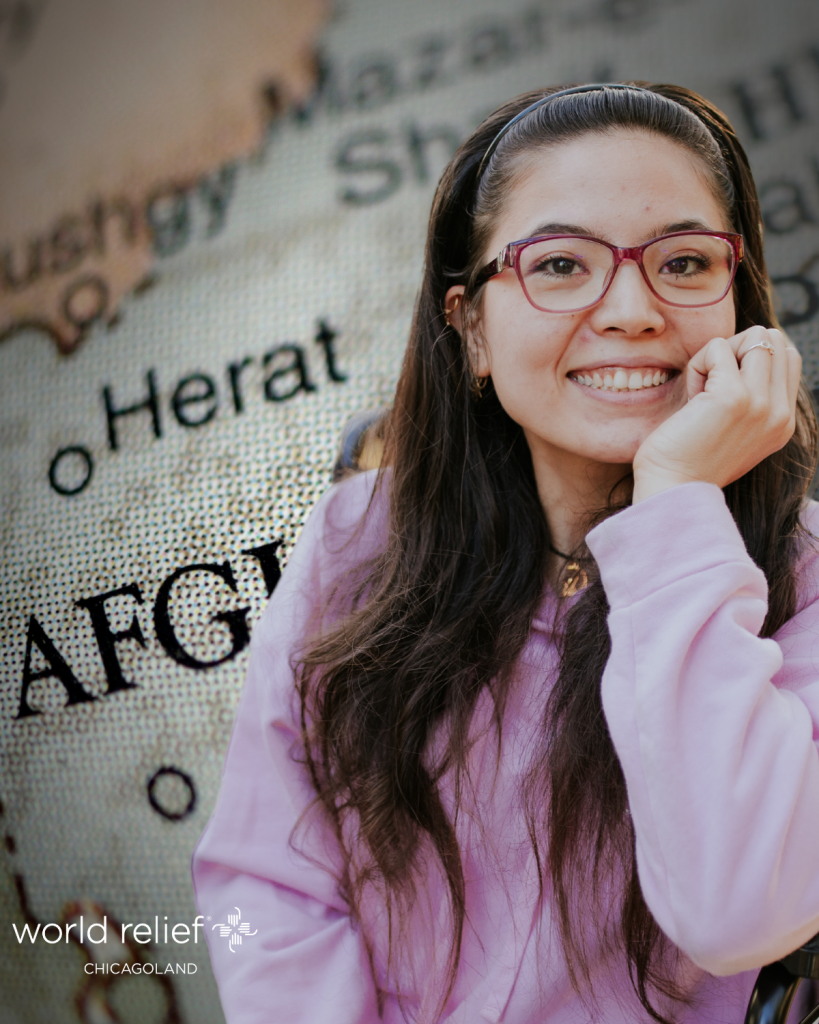
Don’t hold onto assumptions. Someone will always turn them upside down.
“She has taught me a lot about not assuming. Farzana is one of the most go-getting women I’ve ever met in my life.”
Whitney Renfroe
Whitney recognizes how easy it is in our Western culture to draw conclusions or build stereotypes about other cultures based on what’s portrayed in various news and media outlets. But when you take the time to get to know someone, it’s amazing how these portrayals are quickly shattered.
And being a volunteer enables you to experience it.
As Whitney grew closer to Farzana, she found an incredibly educated, resilient, and independent woman who for all practical purposes amplified the American dream. Farzana eagerly grabbed hold of every opportunity given to her. She went from speaking little English to growing exponentially in her usage of it. She began working a job and attending school. And she continued to pursue her passion by getting back onto the basketball courts.
In fact, the nature of their relationship wasn’t exactly how Whitney envisioned it either.
Whitney’s plan was to be a valuable resource for Farzana. Although she took Farzana to her doctor appointments and helped out where needed, much of their time was spent in a different way. “The majority of the time I think was honestly Farzana showing hospitality to me.”
When Whitney came to visit, Farzana was intentional about making her a cup of coffee and spending their time together talking and practicing English. To Farzana, this is where the value lay.
The small things carry weight. Sometimes more than the bigger ones.
Time and location didn’t always make it convenient for Whitney and Farzana to meet regularly. And often it’s this concern that can prevent someone from taking on the role of a friendship partner, health advocate, or youth tutor.
But when they couldn’t meet, Whitney found a number of other things that were just as meaningful. Weekly check-ins were made using WhatsApp, voice messages, or video calls to see how Farzana was doing and to let her know, “Hey . . . I was thinking about you.”
“I think those weekly quick check-ins were really important. It was something small and it didn’t always feel sufficient to me. But that doesn’t mean that there wasn’t a connection made even in those things.”
And with World Relief’s staff partnering with her, Whitney understood she was one piece of a bigger puzzle to help Farzana rebuild her life. “That took a lot of pressure off of me in terms of not feeling like I had to carry the weight of the whole thing. My job was to show up and to be there – to be a resource.”
Addressing the Awkwardness
What about the awkwardness that often accompanies the language barrier in cross-cultural relationships?
Whitney assures others it’s okay to feel awkward. In fact, count on feeling awkward because it will happen. But given what it took for that person to get here, “The least I can do is meet them in the awkward.”
In the meantime, as Farzana learned English, Whitney fell back on nonverbal communication and other small expressions. “You can make a connection without even having words, too. People appreciate a smile, kind gestures like little gifts.”
Sometimes it’s about letting whatever needs to happen in that space, happen.
Being the Bridge
Ultimately, Whitney believes that what it takes to build a cross-cultural relationship is what she strives to be for Farzana. A friend who serves as a bridge between two cultures.
“I would say the reality is, a lot of people come to this country and wonder, ‘Am I going to be accepted? Am I going to make friends? Am I ever going to learn English?’ I think having someone who regularly shows up . . . and just be a kind presence goes a really long way.”
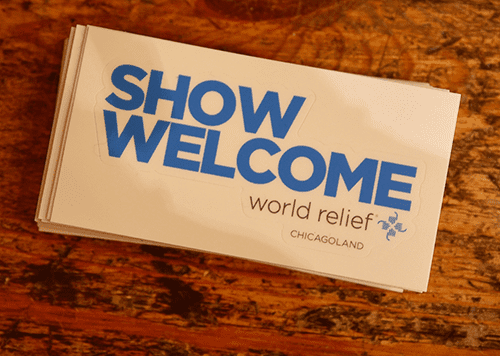
With a higher number of immigrants and refugees arriving in the United States, World Relief Chicagoland needs more volunteers to walk alongside them. Unfortunately, for nonprofits across the nation, volunteering rates have been decreasing. You can be part of the solution — whether it’s becoming a friendship partner, tutoring a young student, or driving someone to a job orientation — there’s a volunteer opportunity to fit your interests and lifestyle. Find the part you play today!
Where can you serve as a volunteer this summer?
Become a Youth Tutor: Read How to Have Impact as a Volunteer Tutor
Serve in a Youth Club or Summer Camp: Read Summer Camp: Fun, Fellowship and First Responders




